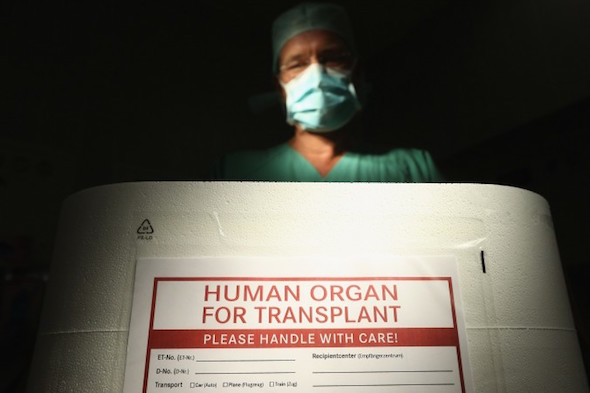Doctors Cast Doubt on China’s Promises of Organ Transplant Reform
Epoch Times
By Larry Ong, Epoch Times and Matthew Robertson, Epoch Times | April 8, 2015

Recent promises by Chinese officials to cease the use of executed prisoners as a source for transplant organs has attracted the scrutiny of a Washington, D.C.-based organization of medical doctors and professionals.
Doctors Against Forced Organ Harvesting (DAFOH), the medical ethics advocacy group, has challenged the Chinese regime’s latest claims to have stopped using organs from prisoners, and have demanded that Chinese transplant officials provide proof of their claims.
It has been known for over a decade that the vast majority of transplant organs in China come from executed prisoners, a state of affairs that violates widely held ethical organ sourcing standards. Increased international criticism in recent years impelled new pledges by the Chinese regime’s organ transplant czar, Huang Jiefu, that China would end the controversial practice by Jan. 1, 2015.
The normally quiet Huang, formerly the deputy health minister, gave a number of widely publicized interviews in March, publicizing the Party’s decision and announcing that the regime had turned a new leaf. He pointedly discouraged reporters from digging into the recent past.
DAFOH, however, urges extreme caution about the content of the new promises, and calls for transparency about the organ harvesting that has already taken place.
In a press release on April 7 it said that the international community “should not find relief” in the new pledges, given that Chinese authorities have a “lengthy record of secrecy, misleading numbers, and contradictory statements.”
The confusing nature of official policy was on full display in some of Huang’s own remarks. On March 13, for example, he repudiated the closest thing China has had to a legal justification for the use of prisoners organs: a secret 1984 regulation under the aegis of the Supreme People’s Court, the Procuratorate, and public security bureau, and three other agencies.
The regulations state that hospitals may use the organs from prisoners as long as family members agree, but that “use of dead bodies or organs from condemned criminals must be kept strictly confidential.”
Huang’s repudiation of these regulations means that “tens of thousands of organ procurements” made since the regulation was enacted are thus illegal and unethical, and the medical staff responsible for those transplants should be prosecuted.
Huang seems aware of the difficulties of the official stance. On March 16 he called the harvesting of prisoners’ organs a “filthy, intractable, sensitive and forbidden area” before hinting strongly that purged Chinese security chief Zhou Yongkang was behind the operations. In this, he effectively backtracked on earlier comments he made to the Australian Broadcasting Corporation and state-run China Daily, where he claimed that the use of organs from executed criminals was ethical by Chinese standards—and even the right thing to do.
As evidence that the new policy of “sunshine and transparency,” in Huang’s words, is highly questionable, DAFOH points to Chinese hospitals that have recently begun scrubbing their websites of incriminating transplant numbers, and in some cases revising downward—by 50 percent—the number of transplants they did two years previously.
“It is evident that China is not ready to join the ethical value-based transplant community as an equal, trusted partner,” DAFOH said. The doctors said that other international and medical watchdog groups should demand greater transparency from the Chinese regime on the issue of organ transplantation.
Instead, DAFOH said that China needs to provide “full disclosure of the use of prisoners of conscience as organ source,” and full transparency and access to the country’s organ procurement system. The first injunction seems unlikely to be fulfilled, judging by Huang Jiefu’s remarks in March.
“We shouldn’t always dwell in the past, always concerned about the page of death row inmates,” he said. “Flip over the page and look at the future. … There is nothing interesting to pay attention to in this. We should pay attention to the future, not the past.”
Researchers, meanwhile, estimate that tens of thousands of prisoners of conscience, the vast majority practitioners of Falun Gong, a spiritual discipline that has been persecuted since 1999, have been executed for their organs. In many cases they are thought to have had their organs removed while they were still alive, and died from the procedure itself. The journalist Ethan Gutmann and two Canadian researchers, David Matas and David Kilgour, a respected human rights lawyer and a former member of the Canadian parliament respectively, used different methodologies to reach similar numbers for how many Falun Gong adherents have likely been killed through harvesting: over 60,000.
